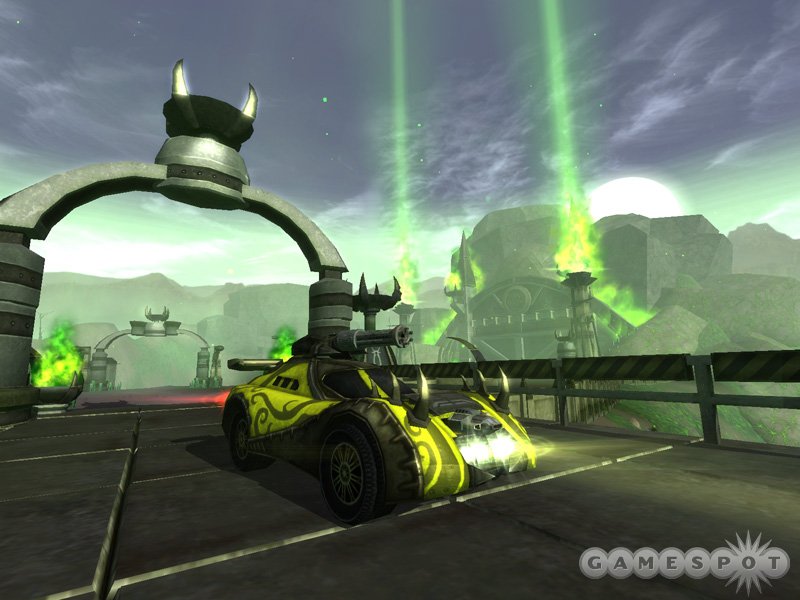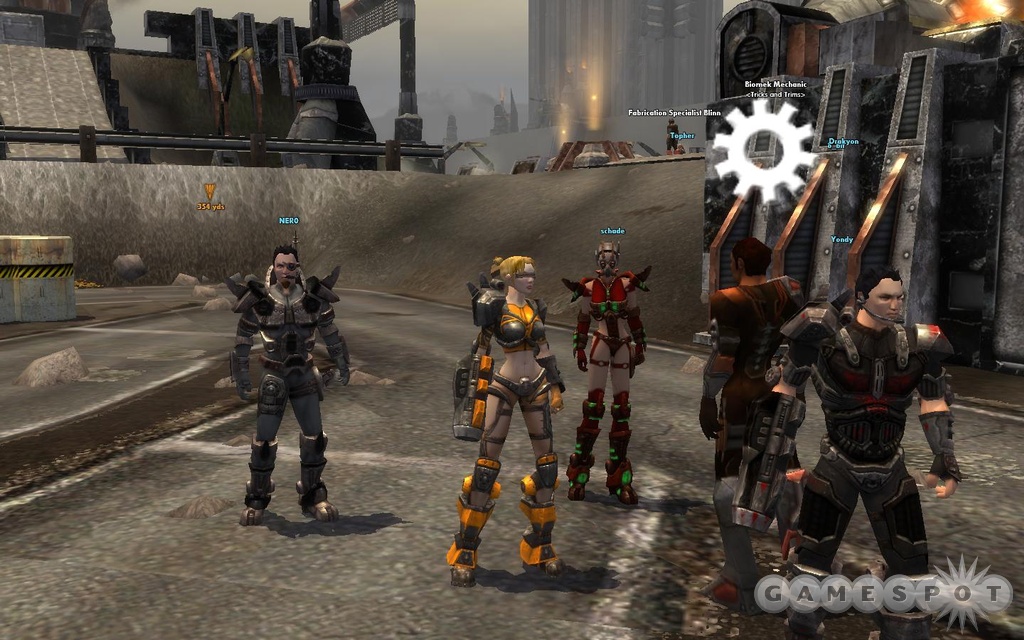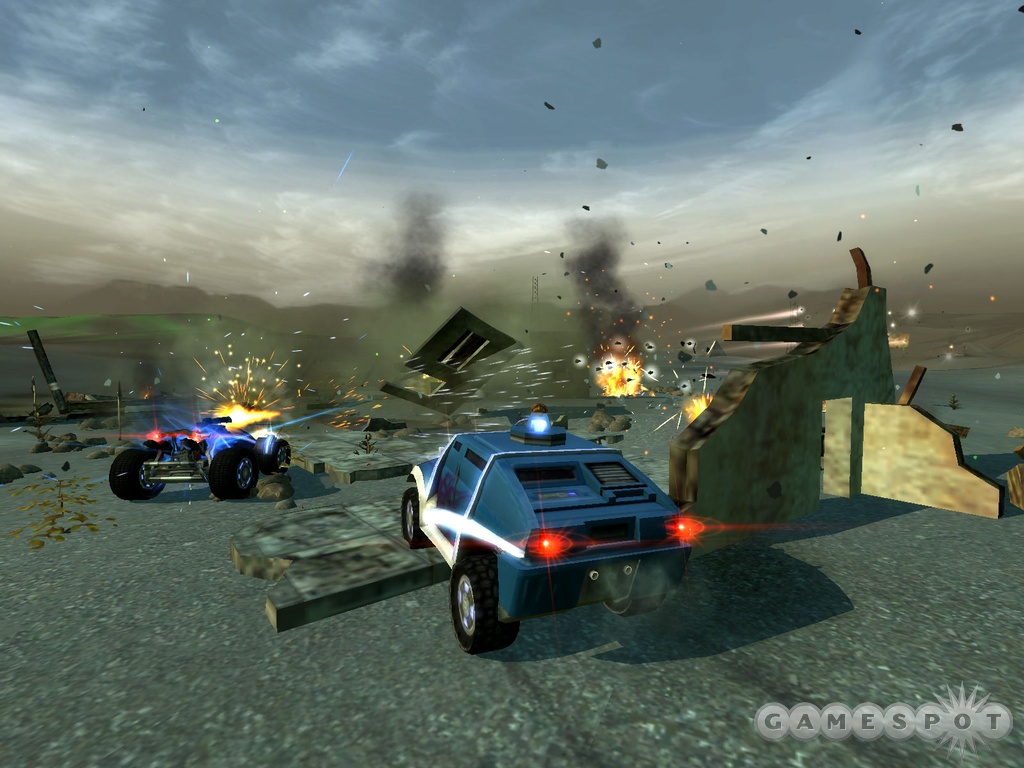Auto Assault Q&A - The Music of Auto Assault
Composer Richard Dekkard gives us some insight into the music of Auto Assault, as well as two songs from the upcoming soundtrack.
Auto Assault launches in two weeks, and this high-speed online role-playing game will put you at the wheel of a combat vehicle in a postapocalpytic world. This is a vast change of pace from the traditional swords-and-sorcery approach to role-playing, and as you can imagine, this also means that you won't hear any of the sweeping orchestral scores that you've become accustomed to in fantasy games. We had the opportunity to ask Richard Dekkard, composer of the music in Auto Assault as well as its sound designer, how this game differs from the rest of the pack when it comes to audio. In addition to answering our questions, he was good enough to send us

GameSpot: As the composer on Auto Assault, what would you say your main musical goals were for the game? Or, in other words, what sort of music did you feel Auto Assault needed?
Richard Dekkard: The main goal was to first give the world a flavor and a theme. Something that--as soon as you heard it--would instantly be known as Auto Assault. This was accomplished by using several tribal instruments, particularly a synthesized variation on a flute. This became a foundation on which to score the rest of the music. However, the world is also harsh (postnuclear) and full of technology, so a blend of ethnic, organic, and electronic textures were used to create the music of the world.
GS: This is a high-speed, action-heavy game, but it's also a role-playing game. Did that mean that you had to create both fast-paced music for the action sequences as well as more-appropriate music for the quieter stretches?
RD: Yes, exactly. There were so many challenges because of the gameplay and technology in this game. Creating the music is not the challenge so much as implementing it. Its important to not have things repeat too much, but still get people pumped up as they play. You also have to leave room for the sound effects and the ambience of the world to come through. I myself am prone to turn music down in games if it gets [to be] too much, so I tried to be very conscious of staying out of the way, while still setting the scene.
GS: One of the great things about online role-playing games is that they can be played for hundreds of hours. What sorts of challenges does that present to you as a composer? There is no way you can score hundreds of hours of music, but you also don't want the player to hear the same music over and over again.
RD: That is a constant consideration, but one of the other great things about online role-playing games is that we can always add content. I will continue to contribute music to the game after it goes live, as well as fine-tune what is there. I know the whole Auto Assault team, as well as myself, am anxious to continue adding content for the players to enjoy.

GS: What were some of the inspirations for the musical themes in Auto Assault? Was there a particular movie or television show, perhaps? For example, if you describe Auto Assault to someone, it sounds like The Road Warrior, but the game also has a strong science fiction theme as well.
RD: That's a tough question to answer. Mad Max meets Blade Runner, maybe? I am certainly a fan of all the stuff produced in these two genres.
GS: What was the collaborative process like for Auto Assault? Do you talk with the designers much about what they envision? Did you get to spend a lot of time with the game to get a feel for it yourself? Or was it more of a case where you had a few guidelines and instructions and had to wing it?
RD: We were very collaborative on it in the broad sense, such as the feel and impression the world would give you, at least as much as time would allow. We had regular meetings to discuss concepts and ideas, and then I was left to be creative and make the music.
GS: What sort of resources did you have to make the soundtrack? Is it mainly you working in the studio on lots of different instruments and machines, or did you have a team to work with?
RD: Auto Assault had only a very limited budget for audio, and I really wanted to see the project succeed. So to help make sure that the best technology and quality could be achieved, my company, Orphic Rez, provided all the resources and equipment to help complete the project. I did have some help with voice-over work provided by Duncan Watt, but other than that, it was nothing but hard work and late nights.
GS: Could you describe your background, and how you got into making music? And how did you get drawn into the industry?
RD: I have been a songwriter and record producer for the last 15 years, and was able to enjoy some great successes with artists like Dido and Seal. I have also done a lot of composing for television and movies. I have been a gamer, however, for much longer. The big draw for me to games is being able to use surround sound (Auto Assault is premixed for Dolby surround sound 5.1), and also a nearly unlimited canvas on which to paint your music. You don't have to conform to "pop chart" arrangements or production techniques.

GS: Finally, this is a broader question, but what are the challenges in making music for a game, especially compared to other mediums?
RD: I think the biggest challenge is to not lose the plot! Music can often take on a life of its own in the studio, and you have to keep it in line to fit the game or genre you are working toward. It's important to have all the music fit together as a whole listening experience. If it doesn't, it will seem disjointed in the context of the game. The other issue is you have to be able to write and produce quickly. Sometimes I only had maybe four hours to complete a piece of music for a two-minute gameplay video that marketing needed yesterday.
GS: Thank you, Richard.
Got a news tip or want to contact us directly? Email news@gamespot.com
Join the conversation